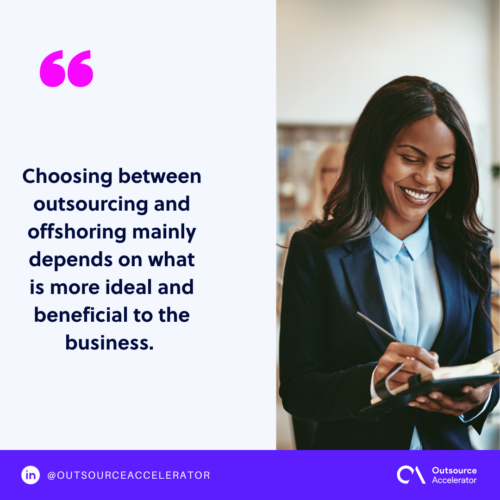Outsourcing vs. offshoring: What’s the difference?

- Outsourcing vs. Offshoring: Knowing Its Difference and Importance
Outsourcing and offshoring work to achieve quite a similar goal of finding a business process strategy that can help businesses cut labor, operational, overhead costs, and other expenses, while simultaneously increasing revenue and sales.
However, outsourcing and offshore strategies differ in some ways, especially how it works, but outsourcing is explained as contracting a business process to a third-party service provider.
Offshoring or overseas outsourcing, on the other hand, takes advantage of having an offshore center. It sends business functions to a services provider located in a different country.
Outsourcing vs. offshoring: What is the most preferred method?
When it comes to benefits, both outsourcing and offshoring can give advantages to the business. For one, outsourcing is a go-to business strategy for its cost advantages. It is the chief motivation of businesses in contracting work to third-party service providers instead of building an additional team in-house.
Another outsourcing benefit is saving time in doing seasonal and menial tasks to focus more on core competency and growing the company. In times that a business doesn’t have the expertise of certain business activities in-house, outsourcing can also be an excellent option.
Offshoring also provides similar benefits as outsourcing. It’s a cost-saving opportunity for offshore outsourcing companies who don’t want to invest in their own infrastructure, additional employees, and necessary equipment. When you outsource offshore, it also opens up a chance for your business to take advantage of competitive skills that can gain them a global edge in the market.
Choosing between outsourcing and offshoring mainly depends on what is more ideal and beneficial to the business. However, there is also an advantage in combining the two: offshore outsourcing. It is to take advantage of both strategies including achieving a more specialized skill that is otherwise not available in-house. It’s also a great middle-ground for lowering costs and expenses but gaining higher productivity and revenue.
While there are countless benefits in outsourcing, offshoring, and combining both, or outsourcing in other countries as well as locally, they are also susceptible to problems and risks. While it makes the business process more convenient, it still adds complexity along with the challenge of having an external organization.
Further, partnering with a BPO company such as Cloudstaff, is a cost-saving opportunity for companies looking to leverage remote talent without spending money on their own infrastructure and necessary equipment.

Top three reasons why companies offshore and outsource
There are a plethora of reasons why outsourcing and offshoring are the go-to strategy for most businesses. Some might go for it to expand their business without much of a hassle, some might opt for outsourcing to ramp up production.
Whether the reason is highly specific or just a generality, let’s discuss them below.
Cost-effectiveness
It’s a no-brainer, of course. Offshoring and outsourcing are cost-effective, both in the long run and short term. Data shows that business owners are able to save up to 70% of their expenses once they participate in the practice.
No more extra overhead expenses, no more extra workspaces and desks, and minimal onboarding cost, too.
Productivity
Most outsourced and offshored employees are paid by their respective agencies. Their team managers and supervisors make sure that they work efficiently, as most (if not all) partners pay for their billable hours.
Workforce diversity
With experts pouring in from different directions and backgrounds, all kinds of problems will seem smaller yet they should retain the same sense of urgency.
According to Science Direct, “Diversity makes the workforce heterogeneous. In the current scenario, employing a diversified workforce is a necessity for every organization but managing such a diversified workforce is also a big challenge for management.”
When do you outsource or offshore your business?
The strategy of business process outsourcing has become common in a lot of businesses. No matter what the size of a company is, whether you run it by yourself or you are a part of a large corporation, outsourcing or offshoring can be extremely beneficial.
These two can be excellent choices for cost-cutting efforts in a business. For one, contracting your work outside the company where the labor cost is cheaper can save you a fortune. Lack of expertise in a certain business function is also a reason to outsource or offshore.
There are cases in that you can either outsource or offshore depending on what works best for you; for example, choosing where to contract your production. However, there are times when a particular business process can be outsourced but is not advisable to be offshored like legal services.

Knowing the how’s and when’s of outsourcing service for businesses
This section discusses the how’s and when’s of outsourcing. You would learn the exact steps on how to begin outsourcing, some of the things to consider before getting into the practice, as well as knowing the best time to start.
Hiring an outsourcing service provider enriches any business as it allows a company to save money and become more efficient. Every company has its own expertise, and outsourcing lets you focus on leveraging your team’s own strengths.
There are some significant advantages to gain when paying others to lend their knowledge and skills to your business. In essence, letting others do what you cannot do better is what outsourcing is all about.
Before delving deeper into the topic, here are a few necessary things to know about business process outsourcing (BPO) that you may find useful as you read on. A question more commonly asked is, outsourcing is when a company does what? Here are some points that can answer this question:
- It means contracting a third party to carry out tasks that were initially performed in-house by your employees.
- It is usually a cost-cutting business strategy.
- It allows you to allocate more of your time and resources to your company’s core competencies.
- It includes both local and foreign hiring, which could also mean establishing a separate infrastructure in a different country. This is otherwise known as offshoring.
- Contrary to insourcing, which is typically done by a third party within a company’s premises, outsourcing is implemented in the service provider’s office or building.

Why are offshoring and outsourcing important?
Both of these practices have been embedded in industries such as technology, manufacturing, retail, and more. It’s nearly impossible to take out even the smallest of branches without causing a massive shift in the workforce.
One of the most well-known reasons why offshoring and outsourcing are important is it gives companies the ability to be flexible. Flexible in terms of scalability of the workforce, workload, and to some extent, in resources as well.
Even offshoring and outsourcing are different from each other – some of their roots weave amongst one another, making them overlap in some instances. This intersection of best practices, methods, and process is what makes them more efficient than ever.
Understanding a little bit about what it means to outsource jobs would help a lot while reading this article.
Now that you know these necessary things, here are the hows and whens of hiring an outsourcing service for your business.







 Independent
Independent




